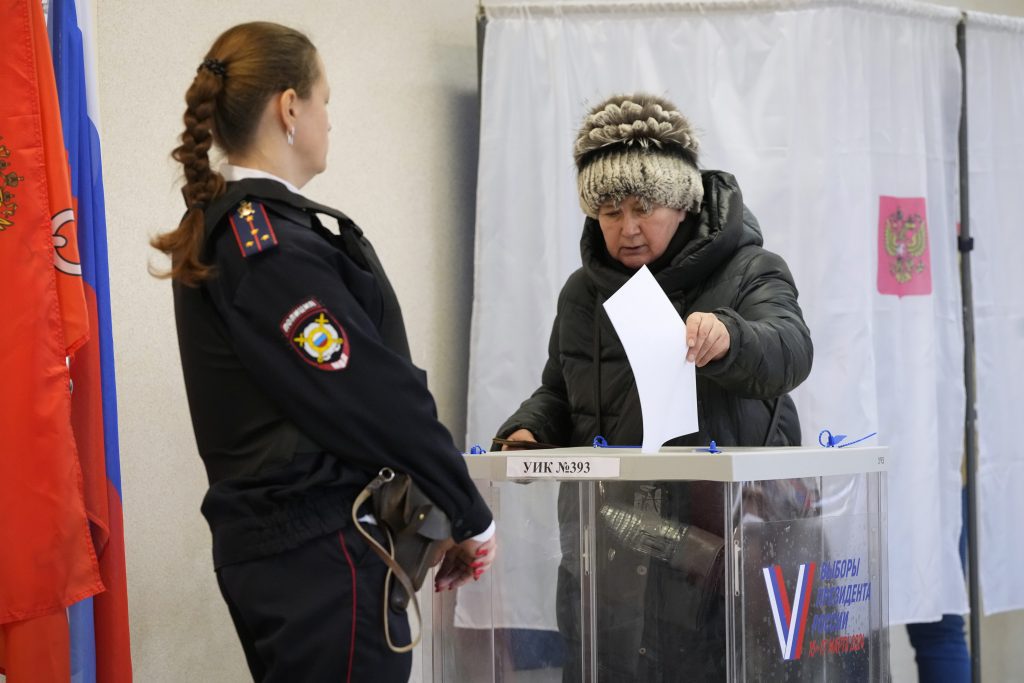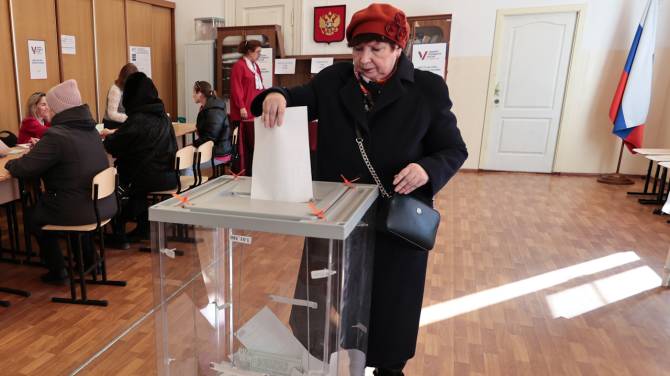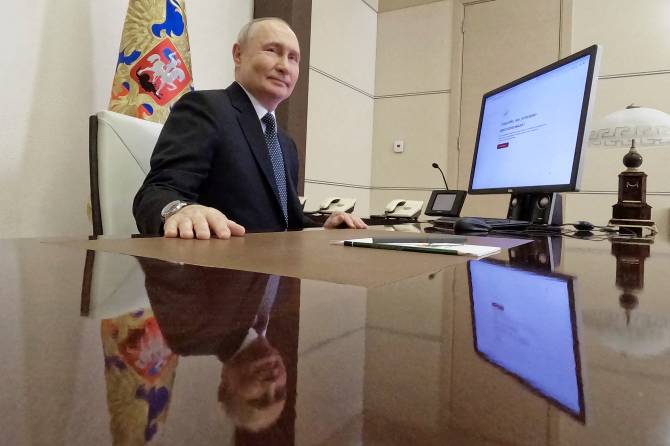Voters all over Russia are voting on the second day of an election that will formalize six more years of power for President Vladimir Putin, who doesn't face serious challengers after suppressing political opposition during his almost 25-year rule.
The election is happening during a severe crackdown that has silenced independent media and prominent rights organizations. Putin’s strongest opponent, Alexei Navalny, died in a prison in the Arctic in February, and other critics are either in jail or in exile.
The 71-year-old Putin has three token opponents from Kremlin-friendly parties who have refrained from criticizing him or his full-scale invasion of Ukraine. Putin has portrayed his war in Ukraine, now in its third year, as a crucial battle against the U.S. and other Western powers determined to destroy Russia.
Officials said voting was going smoothly. But despite strict controls, there were at least six instances of vandalism at polling stations reported on Friday and Saturday, including a firebombing and several people pouring green liquid into ballot boxes. The latter was seemingly in tribute to Navalny, who was attacked in 2017 with green disinfectant.
A 50-year-old university professor was arrested on Saturday after unsuccessfully attempting to pour green liquid into a ballot box in Ekaterinburg. She was detained for 15 days for “petty hooliganism”, but may face additional charges, according to local news outlet Ura.ru. A pensioner in the Altai region in southern Siberia was also detained after trying to damage ballots, as reported by Russia’s state news agency Tass.
In Podolsk, a town near Moscow, a woman was arrested by police on Saturday after defacing her ballot with an unspecified message, according to OVD-Info, a police monitoring group that gives legal assistance. She was charged with “discrediting the Russian army” and fined 30,000 rubles ($342).
Russian lawmakers have proposed a new law to punish election saboteurs with sentences of up to eight years in prison.
Meanwhile, a video posted on social media by Russian election monitoring group Golos seemed to show staff at a polling station in Krasnodar stuffing multiple voting slips into ballot boxes.
Also on Saturday, Ukrainian drone and missile attacks once again struck deep inside the country. Tass reported that an armed group also attempted to enter Russia’s border region from Ukraine.
Two people were killed in Ukrainian shelling of the Russian border city of Belgorod, regional Gov. Vyacheslav Gladkov said on Telegram, instructing shopping centers and schools to close due to the security situation. Meanwhile, local officials refuted reports of explosions at polling stations in the border city, as reported by Tass.
Many people have died in Belgorod since the war began.
Elsewhere, a Ukrainian drone attack ignited a fire at an oil refinery owned by Russian oil company Rosneft in the Samara region, 1,065 kilometers (660 miles) southeast of Moscow, according to the regional governor.
One person died and four others were injured in Kakhovka city in the illegally taken over Kherson region of Ukraine, as reported by the Russia-appointed governor Vladimir Saldo, who blamed a Ukrainian drone attack that he said was intended to disrupt the election.
Previously, Tass reported that a Ukrainian drone also released an explosive on a polling station in the illegally annexed Zaporizhzhia region of Ukraine.
Before the vote, Putin bragged about military successes in Ukraine, where Russian troops have recently made small gains using their advantage in firepower.
On Friday, Putin described the week’s cross-border shelling and incursions by Ukrainian forces as an attempt by Ukraine to scare Russians and thwart the vote. He promised that the attacks “won’t be left unpunished.”
Despite the attacks, experts say the Kremlin needs a high turnout in the election to indicate that Russians support the war and to legitimize Putin for another term.
The Russian defense ministry has been a key factor in growth, working nonstop to produce missiles, tanks and ammunition and helping Russians deal with the economic impact of the war — reducing unemployment and increasing wages. Russia’s wartime economy has also shown resilience, expanding despite tough Western sanctions.
Russia’s opposition movement has called on those dissatisfied with Putin or the war to go to the polls at noon on Sunday, the final day of voting, as a form of protest. The strategy was supported by Navalny shortly before his death.
Voting is happening at polling stations across Russia’s 11 time zones, in illegally annexed regions of Ukraine, and online.
Leaders from the West have criticized the vote as a mockery of democracy.
European Council President Charles Michel sarcastically congratulated Putin on Friday for “his overwhelming victory” in an election that was still technically ongoing. “No opposition. No freedom. No choice,” he wrote on the social media platform X.
Due to the lack of choices for voters, there are very limited opportunities for independent monitoring. No significant international observers were present. Only registered, Kremlin-approved candidates — or state-backed advisory bodies — can assign observers to polling stations, reducing the chances of independent watchdogs.





